Anuj Kumar Sirohi
Enhancing Robustness of Graph Neural Networks through p-Laplacian
Sep 27, 2024
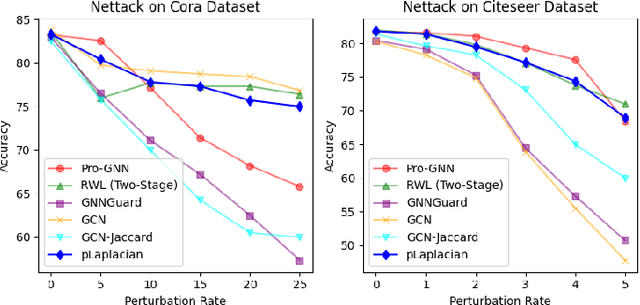

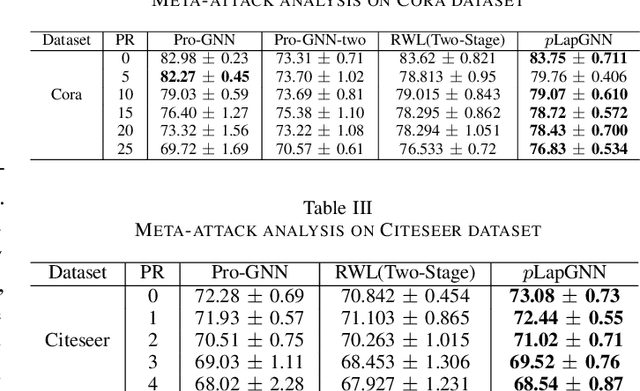
Abstract:With the increase of data in day-to-day life, businesses and different stakeholders need to analyze the data for better predictions. Traditionally, relational data has been a source of various insights, but with the increase in computational power and the need to understand deeper relationships between entities, the need to design new techniques has arisen. For this graph data analysis has become an extraordinary tool for understanding the data, which reveals more realistic and flexible modelling of complex relationships. Recently, Graph Neural Networks (GNNs) have shown great promise in various applications, such as social network analysis, recommendation systems, drug discovery, and more. However, many adversarial attacks can happen over the data, whether during training (poisoning attack) or during testing (evasion attack), which can adversely manipulate the desired outcome from the GNN model. Therefore, it is crucial to make the GNNs robust to such attacks. The existing robustness methods are computationally demanding and perform poorly when the intensity of attack increases. This paper presents a computationally efficient framework, namely, pLapGNN, based on weighted p-Laplacian for making GNNs robust. Empirical evaluation on real datasets establishes the efficacy and efficiency of the proposed method.
GRAPHGINI: Fostering Individual and Group Fairness in Graph Neural Networks
Feb 20, 2024



Abstract:We address the growing apprehension that GNNs, in the absence of fairness constraints, might produce biased decisions that disproportionately affect underprivileged groups or individuals. Departing from previous work, we introduce for the first time a method for incorporating the Gini coefficient as a measure of fairness to be used within the GNN framework. Our proposal, GRAPHGINI, works with the two different goals of individual and group fairness in a single system, while maintaining high prediction accuracy. GRAPHGINI enforces individual fairness through learnable attention scores that help in aggregating more information through similar nodes. A heuristic-based maximum Nash social welfare constraint ensures the maximum possible group fairness. Both the individual fairness constraint and the group fairness constraint are stated in terms of a differentiable approximation of the Gini coefficient. This approximation is a contribution that is likely to be of interest even beyond the scope of the problem studied in this paper. Unlike other state-of-the-art, GRAPHGINI automatically balances all three optimization objectives (utility, individual, and group fairness) of the GNN and is free from any manual tuning of weight parameters. Extensive experimentation on real-world datasets showcases the efficacy of GRAPHGINI in making significant improvements in individual fairness compared to all currently available state-of-the-art methods while maintaining utility and group equality.
No prejudice! Fair Federated Graph Neural Networks for Personalized Recommendation
Dec 20, 2023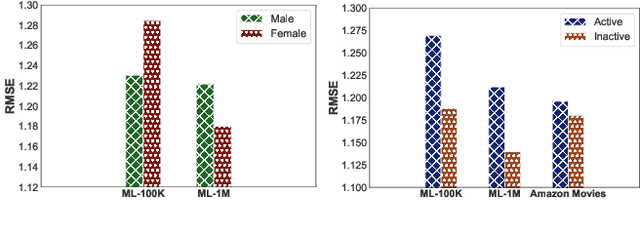
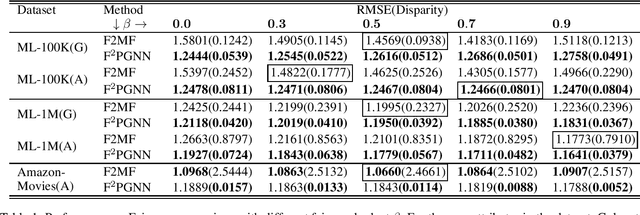

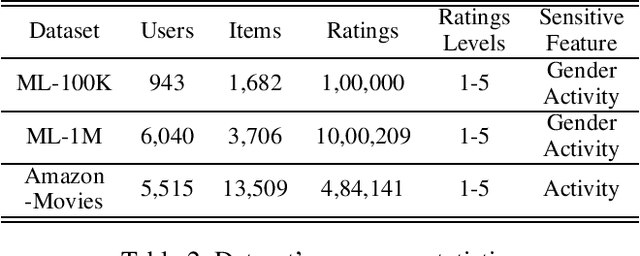
Abstract:Ensuring fairness in Recommendation Systems (RSs) across demographic groups is critical due to the increased integration of RSs in applications such as personalized healthcare, finance, and e-commerce. Graph-based RSs play a crucial role in capturing intricate higher-order interactions among entities. However, integrating these graph models into the Federated Learning (FL) paradigm with fairness constraints poses formidable challenges as this requires access to the entire interaction graph and sensitive user information (such as gender, age, etc.) at the central server. This paper addresses the pervasive issue of inherent bias within RSs for different demographic groups without compromising the privacy of sensitive user attributes in FL environment with the graph-based model. To address the group bias, we propose F2PGNN (Fair Federated Personalized Graph Neural Network), a novel framework that leverages the power of Personalized Graph Neural Network (GNN) coupled with fairness considerations. Additionally, we use differential privacy techniques to fortify privacy protection. Experimental evaluation on three publicly available datasets showcases the efficacy of F2PGNN in mitigating group unfairness by 47% - 99% compared to the state-of-the-art while preserving privacy and maintaining the utility. The results validate the significance of our framework in achieving equitable and personalized recommendations using GNN within the FL landscape.
 Add to Chrome
Add to Chrome Add to Firefox
Add to Firefox Add to Edge
Add to Edge